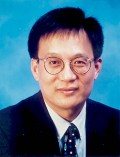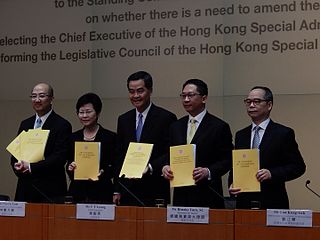Related Research Articles

The politics of Hong Kong takes place in a framework of a political system dominated by its quasi-constitutional document, the Hong Kong Basic Law, its own legislature, the Chief Executive as the head of government and of the Special Administrative Region and of a politically constrained multi-party presidential system. The Government of the Hong Kong Special Administrative Region of the People's Republic of China is led by the Chief Executive, the head of government.

The Basic Law of the Hong Kong Special Administrative Region of the People's Republic of China is a national law of China that serves as the organic law for the Hong Kong Special Administrative Region (HKSAR). Comprising nine chapters, 160 articles and three annexes, the Basic Law was composed to implement Annex I of the 1984 Sino-British Joint Declaration.

The Chief Executive of the Hong Kong Special Administrative Region is the representative of the Hong Kong Special Administrative Region and head of the Government of Hong Kong. The position was created to replace the office of governor of Hong Kong, the representative of the monarch of the United Kingdom during British rule. The office, stipulated by the Hong Kong Basic Law, formally came into being on 1 July 1997 with the handover of Hong Kong from the United Kingdom to the People's Republic of China.

The Legislative Council of the Hong Kong Special Administrative Region (LegCo) is the unicameral legislature of Hong Kong. It sits under China's "one country, two systems" constitutional arrangement, and is the power centre of Hong Kong's hybrid representative democracy, though popular representation in the legislature has diminished significantly in recent years, along with its political diversity.

The 2004 Hong Kong Legislative Council election was held on 12 September 2004 for members of the Legislative Council of Hong Kong (LegCo). The election returned 30 members from directly elected geographical constituencies and 30 members from functional constituencies, of which 11 were unopposed.

In the political systems of Hong Kong, a functional constituency is a professional or special interest group involved in the electoral process. Eligible voters in a functional constituency may include natural persons as well as other designated legal entities such as organisations and corporations.

Hong Kong Basic Law Article 45 is an article in the Basic Law of Hong Kong. It states that the Chief executive should be chosen by universal suffrage upon nomination by a broadly representative nominating committee as an eventual goal.

Elections in Hong Kong take place when certain political offices in the government need to be filled. Hong Kong has a multi-party system, with numerous parties in the Legislative Council. The Chief Executive of Hong Kong is nonpartisan but has to work with several parties to form a coalition government.

Legislative elections are held in Hong Kong every four years Legislative Council (LegCo) in accordance with Article 69 of the Basic Law. Legislative elections are held either at the expiry of a four-year term or when the Chief Executive dissolves the legislature and calls a new election.

The 2005 Hong Kong Chief Executive election was held to fill the vacancy of the territory's top office. Then Chief Executive Tung Chee-hwa submitted his resignation to the central government in Beijing, and was officially approved on 12 March. As Donald Tsang, Chief Secretary for Administration in Tung's cabinet, was the only candidate, he was declared elected unopposed on 16 June. Tsang took office on 21 June to begin his first two-year term.

Maria Tam Wai-chu is a senior Hong Kong politician and lawyer. She is a member of the Committee for the Basic Law of the National People's Congress Standing Committee (NPCSC) since 1997 and the chairman of the Operations Review Committee of the Independent Commission Against Corruption (ICAC) since 2015.

Democratic development in Hong Kong has been a major issue since its transfer of sovereignty to the People's Republic of China in 1997. The one country, two systems principle allows Hong Kong to enjoy high autonomy in all areas besides foreign relations and defence, which are responsibilities of the central government. Hong Kong's Basic Law, also adopted after the 1997 handover, allowed residents to vote for local district councillors and directly elect about half of the region's legislators at the time. Many Hongkongers became concerned, however, after the first Chief Executive, Tung Chee-hwa, appeared to have mishandled this issue, while human rights and universal suffrage have also become focal points for the pro-democracy camp.
The 2010 Hong Kong electoral reform was the series of events began in 2009 and finalised in 2010 under the Consultation Document on the Methods for Selecting the Chief Executive and for Forming the Legislative Council in 2012, a document published on 18 November 2009 by the Government of Hong Kong to broaden the scope of political participation and increase the democratic elements in the 2012 elections in line with the Hong Kong Basic Law.

Occupy Central with Love and Peace (OCLP) was a single-purpose Hong Kong civil disobedience campaign initiated by Reverend Chu Yiu-ming, Benny Tai and Chan Kin-man on 27 March 2013. The campaign was launched on 24 September 2014, partially leading to the 2014 Hong Kong protests. According to its manifesto, the campaign advocates for an electoral system in Hong Kong that is decided through a democratic process and satisfies international standards of universal and equal suffrage. With the first three stages of the movement – dialogue, deliberation and citizens' authorization – the civil disobedience that follows must be non-violent.

The 2014–2015 Hong Kong electoral reform was a proposed reform for the 2017 Hong Kong Chief Executive election and 2016 Legislative Council election.
Qiao Xiaoyang is the former chairman of the Hong Kong SAR Basic Law Committee of the 11th National People's Congress.
The 2005 Hong Kong electoral reform was carried out in late 2005 for the selection of the Chief Executive of Hong Kong (CE) in 2007 and Legislative Council of Hong Kong (LegCo) in 2008. The reform proposals were ultimately voted down by the pro-democracy camp.

The 2021 Hong Kong electoral changes were initiated by the National People's Congress (NPC) on 11 March 2021 to "amend electoral rules and improve the electoral system" of the Hong Kong Special Administrative Region (HKSAR) for its Chief Executive (CE) and the Legislative Council (LegCo), in order to ensure a system in which only "patriots", according to the Chinese definition, govern Hong Kong. The reforms have been widely criticized for their negative impact on the democratic representation in the Hong Kong legislature.

The 2021 Election Committee subsector elections were held on 19 September 2021 for elected seats of the 1,500 members of the Election Committee (EC) which is responsible for electing 40 of the 90 seats in the Legislative Council (LegCo) in the 2021 election and the Chief Executive of Hong Kong (CE) in the 2022 election.

The Public Offices Ordinance 2021 is an ordinance to amend the Oaths and Declarations Ordinance and other relating legislation which adds new requirements for the Chief Executive, Executive Council members, Legislative Council members and judges and other judicial officers, imposes oath-taking requirements on District Council members, and specifies requirements for candidates to swear to uphold the Basic Law and bear allegiance to the Hong Kong Special Administrative Region when assuming office or standing for election and also adds new grounds and mechanism for disqualification from holding the office or being nominated as a candidate. The ordinance was seen as another round of the Beijing authorities to bar the opposition from standing in elections or holding public offices and also raised concerns on the bill's vague parameters of the oath with such over-reaching scope would undermine Hong Kong's judicial independence.
References
- ↑ "Full text of NPC decision on universal suffrage for HKSAR chief selection". Xinhua News Agency. 31 August 2014. Archived from the original on 31 August 2014. Retrieved 31 August 2014.
- ↑ The Hong Kong Special Administrative Region Government (2013). Methods for Selecting the Chief Executive in 2017 and for Forming the Legislative Council in 2016 Consultation Document (PDF). p. 3.
- ↑ HK basic law web pdf. "HK basic law." The Basic Law of the Hong Kong Special Administrative region of the People's Republic of China. Retrieved on 8 January 2007.
- ↑ Lee, Colleen; But, Joshua (25 March 2013). "Opponents of Beijing ineligible to be CE: top Chinese official". South China Morning Post .
- ↑ The Hong Kong Special Administrative Region Government 2013, p. 3.
- ↑ Cheung, Tony; Chong, Tanna (22 November 2013). "Catch-22 situation looms over election for chief executive in 2017". South China Morning Post.
- 1 2 3 4 5 Tenth Session of the Standing Committee of the Twelfth National People's Congress (31 August 2014). "Decision of the Standing Committee of the National People's Congress on Issues Relating to the Selection of the Chief Executive of the Hong Kong Special Administrative Region by Universal Suffrage and on the Method for Forming the Legislative Council of the Hong Kong Special Administrative Region in the Year 2016" (PDF).
- 1 2 "Beijing says no to open elections in Hong Kong". CNN. 5 September 2014.
- 1 2 Buckley, Chris; Forsythe, Michael (31 August 2014). "China Restricts Voting Reforms for Hong Kong". The New York Times. Retrieved 31 August 2014.
- ↑ "'Collective nomination' does not accord with Basic Law". South China Morning Post. 22 December 2013.
- ↑ 學聯發公開信 提對話二前提 [Federation of Students sends a letter naming two prerequisites]. Hong Kong Economic Journal (in Chinese). Archived from the original on 31 October 2014. Retrieved 31 October 2014.
- ↑ "Public Opinion & Political Development in Hong Kong Survey Results (Press Release) October 22, 2014" (PDF). Chinese University of Hong Kong. Archived from the original (PDF) on 31 October 2014. Retrieved 5 September 2016.
- ↑ Cheung, Gary; Cheung, Tony; Lam, Jeffie (1 June 2015). "Beijing officials get tough with pan-democrats over Hong Kong electoral reform stance". South China Morning Post.
- ↑ Lau, Kenneth (1 June 2015). "No choice but to veto proposal". The Standard. Archived from the original on 26 June 2015. Retrieved 26 February 2017.
- ↑ "Hong Kong legislators reject China-backed reform bill". CNN. 19 June 2015. Retrieved 19 June 2015.